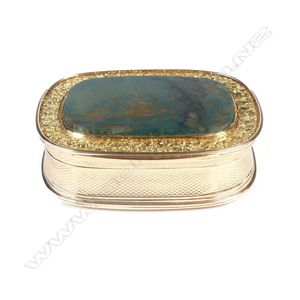18th Century Two Colour Gold and Hardstone Snuff Box
An outstanding 18th century two colour gold and hardstone panelled snuff box, of rounded oblong shape with slightly concave walls, the hinged lid with a conforming shaped inset panel of agate revealing attractive translucency and diverse colour when opened, the panel set in a bright yellow gold chased and engraved acorn and oak leaf pattern border, the rose gold walls machine engraved with a guilloche pattern, another conforming agate panel to the base. 2.44 in. x 1.81 in. x 0.83 in.
You must be a subscriber, and be logged in to view price and dealer details.
Register Now to view actual auction price for this item.
- Guilloche - A form of classical decoration consisting of a repeating ornament of interlacing curved bands, sometimes forming circles, and further decorated with rosettes or other flower forms.
The name is derived from the inventor, French engineer Guillot, who invented a mechanical method of inscribing fine repeating patterns on to metallic surfaces.
On enamelled items with guilloche decoration, the surface is firstly engraved with the repeating pattern, and then covered with several layers of enamel, each of which is fired.
Where the item has not been enamelled the form of decoration is usually called "engine turned". - Agate - Agate is a type of semi-precious gemstone that is made up of silica dioxide, a mineral that is also found in quartz. It is known for its distinctive banded patterns, which are created as layers of silica are deposited in different colours including red, orange, yellow, green, blue, and purple. It is often used in jewellery, decorative objects, and other decorative items, and it is prized for its beauty and durability. Agate is found in many parts of the world, including Brazil, India, and the United States.
- Oak - Native to Europe and England, oak has been used for joinery, furniture and building since the beginning of the medieval civilisation. It is a pale yellow in colour when freshly cut and darkens with age to a mid brown colour.
Oak as a furniture timber was superceded by walnut in the 17th century, and in the 18th century by mahogany,
Semi-fossilised bog oak is black in colour, and is found in peat bogs where the trees have fallen and been preserved from decay by the bog. It is used for jewellery and small carved trinkets.
Pollard oak is taken from an oak that has been regularly pollarded, that is the upper branches have been removed at the top of the trunk, result that new branches would appear, and over time the top would become ball-like. . When harvested and sawn, the timber displays a continuous surface of knotty circles. The timber was scarce and expensive and was used in more expensive pieces of furniture in the Regency and Victorian periods. - Hardstone - Hardstone is not a scientific name for a particular gemstone, but a word used to describe any one or more semi-precious stones used in jewellery and decorative arts, and can include jade, agate, onyx, rock crystal, amber, jet and carnelian. Softer stones and minerals such as soapstone, and alabaster and hard stones used in building such as marble or granite are generally excluded.
This item has been included into following indexes:
